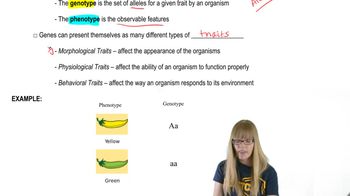You are a genetic counselor, and several members of the family whose pedigree for an inherited disorder is depicted in Genetic Analysis 17.2 consult with you about the probability that their progeny may be afflicted. What advice would you give individuals III-1, III-2, III-4, III-6, III-8, and III-9?
Table of contents
- 1. Introduction to Genetics51m
- 2. Mendel's Laws of Inheritance3h 37m
- 3. Extensions to Mendelian Inheritance2h 41m
- 4. Genetic Mapping and Linkage2h 28m
- 5. Genetics of Bacteria and Viruses1h 21m
- 6. Chromosomal Variation1h 48m
- 7. DNA and Chromosome Structure56m
- 8. DNA Replication1h 10m
- 9. Mitosis and Meiosis1h 34m
- 10. Transcription1h 0m
- 11. Translation58m
- 12. Gene Regulation in Prokaryotes1h 19m
- 13. Gene Regulation in Eukaryotes44m
- 14. Genetic Control of Development44m
- 15. Genomes and Genomics1h 50m
- 16. Transposable Elements47m
- 17. Mutation, Repair, and Recombination1h 6m
- 18. Molecular Genetic Tools19m
- 19. Cancer Genetics29m
- 20. Quantitative Genetics1h 26m
- 21. Population Genetics50m
- 22. Evolutionary Genetics29m
3. Extensions to Mendelian Inheritance
Organelle DNA
Problem 16
Textbook Question
A 50-year-old man has been diagnosed with MELAS syndrome. His wife is phenotypically normal, and there is no history of MELAS syndrome in either of their families. The couple is concerned about whether their children will develop the disease. As a genetic counselor, what will you tell them? Would your answer change if it were the mother who exhibited disease symptoms rather than the father?
 Verified step by step guidance
Verified step by step guidance1
Step 1: Understand the inheritance pattern of MELAS syndrome. MELAS (Mitochondrial Encephalopathy, Lactic Acidosis, and Stroke-like episodes) is caused by mutations in mitochondrial DNA (mtDNA). Mitochondrial DNA is inherited exclusively from the mother, as sperm do not contribute mitochondria to the zygote during fertilization.
Step 2: Analyze the scenario where the father has MELAS syndrome. Since mitochondrial DNA is inherited maternally, the father's condition does not affect the mitochondrial DNA of his children. Therefore, the children will not inherit MELAS syndrome from the father.
Step 3: Consider the scenario where the mother has MELAS syndrome. If the mother carries a mutation in her mitochondrial DNA, all of her children will inherit the mutated mitochondrial DNA, as mitochondrial inheritance is non-Mendelian and exclusively maternal.
Step 4: Explain the implications to the couple. If the mother is phenotypically normal, the children are not at risk of inheriting MELAS syndrome. However, if the mother exhibits symptoms of MELAS syndrome, genetic testing of her mitochondrial DNA can confirm whether the mutation is present and assess the risk for her children.
Step 5: Recommend genetic counseling and testing. If the mother is suspected to carry a mitochondrial mutation, further testing can provide clarity. Additionally, discuss reproductive options, such as mitochondrial replacement therapy, which can help prevent transmission of mitochondrial diseases.
 Verified video answer for a similar problem:
Verified video answer for a similar problem:This video solution was recommended by our tutors as helpful for the problem above
Video duration:
2mPlay a video:
Was this helpful?
Key Concepts
Here are the essential concepts you must grasp in order to answer the question correctly.
Mitochondrial Inheritance
MELAS syndrome is a mitochondrial disorder, meaning it is caused by mutations in mitochondrial DNA (mtDNA), which is inherited exclusively from the mother. This type of inheritance pattern is crucial for understanding the risk of passing on the condition, as only the mother can transmit mitochondrial mutations to her offspring.
Recommended video:
Guided course

Organelle Inheritance
Penetrance and Expressivity
Penetrance refers to the proportion of individuals with a specific genotype that actually express the associated phenotype, while expressivity describes the degree to which a genotype is expressed in an individual. In the case of MELAS, even if a child inherits a mutation, the severity and presence of symptoms can vary, making it important to discuss these concepts with the couple.
Recommended video:
Guided course

Penetrance and Expressivity
Risk Assessment in Genetic Counseling
In genetic counseling, assessing the risk of passing on genetic conditions involves evaluating family history, the mode of inheritance, and the specific genetic factors involved. If the father has MELAS, the risk to children is low, but if the mother were affected, the risk would be significant due to maternal inheritance patterns.
Recommended video:
Guided course

Descriptive Genetics

 4:11m
4:11mWatch next
Master Organelle DNA Characteristics with a bite sized video explanation from Kylia
Start learningRelated Videos
Related Practice
Textbook Question
669
views
